雅思口语Part1答题技巧分享
雅思口语考试part1问题分类归纳
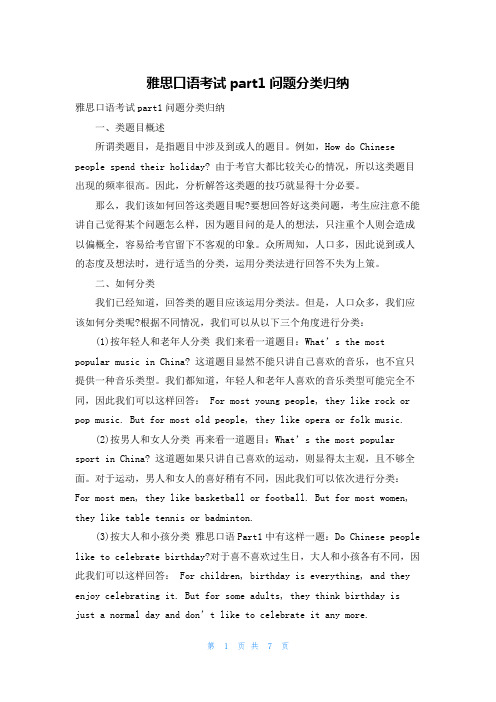
雅思口语考试part1问题分类归纳雅思口语考试part1问题分类归纳一、类题目概述所谓类题目,是指题目中涉及到或人的题目。
例如,How do Chinese people spend their holiday? 由于考官大都比较关心的情况,所以这类题目出现的频率很高。
因此,分析解答这类题的技巧就显得十分必要。
那么,我们该如何回答这类题目呢?要想回答好这类问题,考生应注意不能讲自己觉得某个问题怎么样,因为题目问的是人的想法,只注重个人则会造成以偏概全,容易给考官留下不客观的印象。
众所周知,人口多,因此说到或人的态度及想法时,进行适当的分类,运用分类法进行回答不失为上策。
二、如何分类我们已经知道,回答类的题目应该运用分类法。
但是,人口众多,我们应该如何分类呢?根据不同情况,我们可以从以下三个角度进行分类:(1)按年轻人和老年人分类我们来看一道题目:What’s the most popular music in China? 这道题目显然不能只讲自己喜欢的音乐,也不宜只提供一种音乐类型。
我们都知道,年轻人和老年人喜欢的音乐类型可能完全不同,因此我们可以这样回答: For most young people, they like rock or pop music. But for most old people, they like opera or folk music.(2)按男人和女人分类再来看一道题目:What’s the most popular sport in China? 这道题如果只讲自己喜欢的运动,则显得太主观,且不够全面。
对于运动,男人和女人的喜好稍有不同,因此我们可以依次进行分类:For most men, they like basketball or football. But for most women, they like table tennis or badminton.(3)按大人和小孩分类雅思口语Part1中有这样一题:Do Chinese people like to celebrate birthday?对于喜不喜欢过生日,大人和小孩各有不同,因此我们可以这样回答: For children, birthday is everything, and they enjoy celebrating it. But for some adults, they think birthday isjust a normal day and don’t like to celebrate it any more.(4)一般分类雅思口语Part1中还有这样一题:Is teaching a popular job in China? 对于教师在到底是不是流行的工作,真是公说公有理,婆说婆有理,每个人的意见都可能出现分歧。
雅思口语常见题型如何回答拿高分

雅思口语常见题型如何回答拿高分雅思口语考试,一场与考官面对面的“厮杀”,当然,你也不用可怕,答得美丽自然也会赢得美丽,那么在这短短的11-14分钟口语考试,你知道怎样回答才能拿高分吗?雅思口语常见题型,如何回答拿高分考试的第一部分,也许4-5分钟,通常考官都会提问些比较简单的问题。
例如:Where are you from?(你来自哪?)Why are you studying English?(为什么学英语呀?)Have you visited any English speaking countries?(去过说英语的国家吗?)Do you play any sports?(你参与什么运动吗?)建议:这个时候,你应当给考官一个比较全面的回答,这是给对方留下第一好印象的时刻。
1、回答不能太短。
Where are you from?Im from Shanghai in China. Its the largest city in China.Its a modern city but with a lot of history and a lovely place to live. 我来自中国上海(到这不能停),上海是中国最大的城市,是一座现代化的大城市,历史也很悠久,是一个特别适合居住的地方。
2、回答的时候可以适当举例说明。
Why are you preparing for the IELTS exam?Because I need it for my studies. Ive been offered a place at a university in England to study on an MBA but I need to show my level of English is good enough.为了学习(到这不能停),我已经被英国一家高校的MBA录用了,但是我需要证明自己的语言水平足够好。
雅思口语Part1重要性及备考方法

雅思口语Part1重要性及备考方法
雅思口语Part 1是雅思口语考试中的第一部分,也是最容易的部分。
它主要通过一些简单的问题来了解考生的个人信息、日常生活、兴趣爱好等。
下面是关于雅思口语Part 1的重要性及备考方法:
重要性:
1. Part 1是雅思口语考试的开场部分,考官会通过这一部分来热身和了解考生,其目的是让考生逐渐适应口语考试环境,消除紧张情绪。
2. Part 1的题目相对简单,考生可以展示自己的英语基础,提高分数。
3. Part 1的问题都比较常见,准备充分可以避免临时慌乱,保证回答流利和准确。
备考方法:
1. 多听多说:多听英语口语材料,尤其是和日常生活相关的话题,加强英语口语的输入。
同时,多与人交流,增加口语输出的机会,提高口语表达能力和流利度。
2. 关注常见题目:整理雅思Part 1常见问题的题库,做好答题准备。
常见的话题包括家庭、工作、旅行、兴趣爱好、食品等,重点准备这些话题。
3. 模拟练习:找到一位熟悉雅思口语考试的人,进行模拟口语练习。
通过模拟考试,熟悉考试形式和时间,训练自己的口语回答能力。
4. 注意语音语调:练习口语时,注意语音语调的准确性和自然流利性。
可以通过模仿和录音练习来改善语音语调,使口语表达更加自然。
总之,雅思口语Part 1虽然比较简单,但是也需要充分准备才能发挥出自己的水平,重点是多听多说、关注常见题目、模拟练习和注意语音语调,这样可以在雅思口语考试中取得更好的成绩。
雅思口语考试的答题技巧(精选)
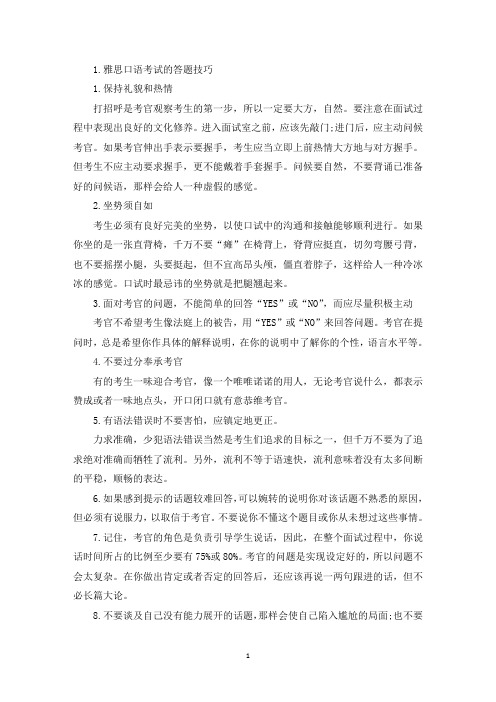
1.雅思口语考试的答题技巧1.保持礼貌和热情打招呼是考官观察考生的第一步,所以一定要大方,自然。
要注意在面试过程中表现出良好的文化修养。
进入面试室之前,应该先敲门;进门后,应主动问候考官。
如果考官伸出手表示要握手,考生应当立即上前热情大方地与对方握手。
但考生不应主动要求握手,更不能戴着手套握手。
问候要自然,不要背诵已准备好的问候语,那样会给人一种虚假的感觉。
2.坐势须自如考生必须有良好完美的坐势,以使口试中的沟通和接触能够顺利进行。
如果你坐的是一张直背椅,千万不要“瘫”在椅背上,脊背应挺直,切勿弯腰弓背,也不要摇摆小腿,头要挺起,但不宜高昂头颅,僵直着脖子,这样给人一种冷冰冰的感觉。
口试时最忌讳的坐势就是把腿翘起来。
3.面对考官的问题,不能简单的回答“YES”或“NO”,而应尽量积极主动考官不希望考生像法庭上的被告,用“YES”或“NO”来回答问题。
考官在提问时,总是希望你作具体的解释说明,在你的说明中了解你的个性,语言水平等。
4.不要过分奉承考官有的考生一味迎合考官,像一个唯唯诺诺的用人,无论考官说什么,都表示赞成或者一味地点头,开口闭口就有意恭维考官。
5.有语法错误时不要害怕,应镇定地更正。
力求准确,少犯语法错误当然是考生们追求的目标之一,但千万不要为了追求绝对准确而牺牲了流利。
另外,流利不等于语速快,流利意味着没有太多间断的平稳,顺畅的表达。
6.如果感到提示的话题较难回答,可以婉转的说明你对该话题不熟悉的原因,但必须有说服力,以取信于考官。
不要说你不懂这个题目或你从未想过这些事情。
7.记住,考官的角色是负责引导学生说话,因此,在整个面试过程中,你说话时间所占的比例至少要有75%或80%。
考官的问题是实现设定好的,所以问题不会太复杂。
在你做出肯定或者否定的回答后,还应该再说一两句跟进的话,但不必长篇大论。
8.不要谈及自己没有能力展开的话题,那样会使自己陷入尴尬的局面;也不要当听到考官问及自己熟悉或经过充分准备的话题,就立即把自己准备好的答案一字不差,滔滔不绝地背诵出来。
雅思口语part1答题技巧课件-原创
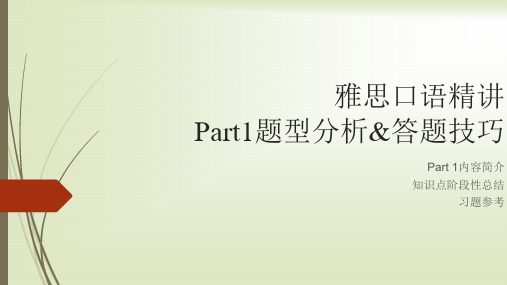
What is famous about your hometown?
Criteria评分标准
常见adj替换
6
commonly used adjs:
good---fantastic,fabulous,brilliant,excellent,
beautiful---breathtaking,gorgeous,amazing
interesting---intriguing,amusing,hilarious happy---delighted,overjoyed,pleasant
Exercises:
Do u like rainy days? How does rain affect people's mood? What types of weather do chinese people usually like? Is weather important in traveling ?
知识点阶段性总结
答题思路:表达观点+内容展开 表达观点时常用副词: 语气较强的副词开句:undoubtedly, unquestionably,absolutely, definitely, Obviously, apparently, certainly, surely, etc. 语气较平缓的副词开句:normally,actually, generally, frankly, honestly, basically, theoretically, technically, currently, and etc. 表达观点时常用词组: in my opinion, from my point of view, in my view, from my perspective,etc. 句首可用的词组:as a matter of fact , off the top of my head, as far as i'm concerned , 展开技巧: 举例子、列原因、表达感受
雅思口语PART1话题总结
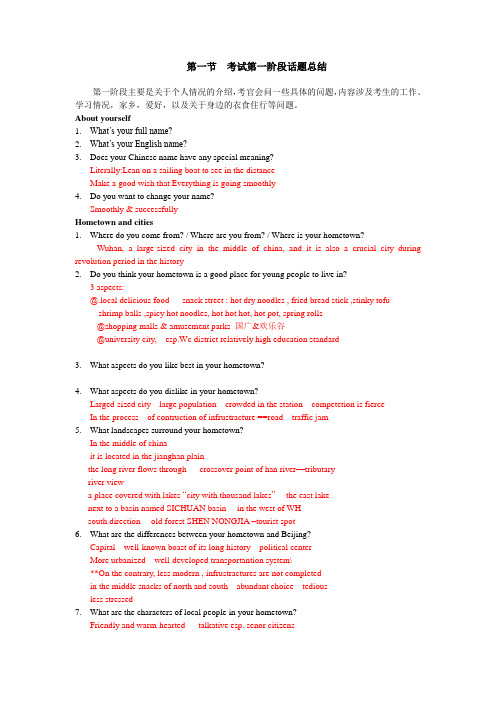
第一节考试第一阶段话题总结第一阶段主要是关于个人情况的介绍,考官会问一些具体的问题,内容涉及考生的工作、学习情况,家乡,爱好,以及关于身边的衣食住行等问题。
About yourself1.What’s your full name?2.What’s your English name?3.Does your Chinese name have any special meaning?Literally:Lean on a sailing boat to see in the distanceMake a good wish that Everything is going smoothly4.Do you want to change your name?Smoothly & successfullyHometown and cities1.Where do you come from? / Where are you from? / Where is your hometown?Wuhan, a large-sized city in the middle of china, and it is also a crucial city during revolution period in the history2.Do you think your hometown is a good place for young people to live in?3 aspects:@.local delicious food snack street : hot dry noodles , fried bread stick ,stinky tofushrimp balls ,spicy hot noodles, hot hot hot, hot pot, spring rolls@shopping malls & amusement parks 国广&欢乐谷@university city, esp.Wc district relatively high education standard3.What aspects do you like best in your hometown?4.What aspects do you dislike in your hometown?Larged-sized city large population crowded in the station competetion is fierceIn the process of contruction of infrustracture ==road traffic jam5.What landscapes surround your hometown?In the middle of chinait is located in the jianghan plainthe long river flows through crossover point of han river—tributaryriver viewa place covered with lakes “city with thousand lakes” ---the east lakenext to a basin named SICHUAN basin ---in the west of WHsouth direction ---old forest SHEN NONGJIA –tourist spot6.What are the differences between your hometown and Beijing?Capital well-known boast of its long history political centerMore urbanized well-developed transportantion system\**On the contrary, less modern , infrustractures are not completedin the middle snacks of north and south abundant choice tediousless stressed7.What are the characters of local people in your hometown?Friendly and warm-hearted talkative esp. senor citizensStraightforward express feeling loudly and directlyBad-tempered quarrel on the streetBe fond of food and drinksEnjoy themselves entertainments MAJIANG POKER8.What is the main food /special snack in your hometown?9.Are there any changes in your hometown?During city constructiontransportation facilities skyscapers dapartment stores environment greenbeltricher more cars on the road traffic congestion more sever10.Do you prefer to live in a big city or a small one? Why?Big cityConvenient shopping more optionswell-developed transportationmore choices to have funhigher standard of edu, open-minded11.What are the differences between living in a big city and in the countryside?Less poplulationMore quietGood envirnment less populationLess stressedA good place for holidayWork and study1.Are you working or studying?2.Where do you study?3.Could you describe your college/university/school?4.What’s your major?5.Why did you choose the major?Inspired by mother journalist cool job go to different places visit different people see lots of things interested inPsychology interested as well read many books psychoanalysis Freud seminars programs rural areas to help children with mental issues6.Do you think your college/university is a good place to study in?Equipped with teaching facilities &Excellent teachersBautiful place lakeside ---the east lake good environment morning readingOlympics Champions training diligent surroundingsHandsome guys good stress reducer by looking at them training7.What aspects do you dislike in your college/university?Library is too small dorm cannot find a seat lateBathroom in the dorm public inconvenientShower room is too far away esp. winter freezing cold on the way back8.What’s your plan in the near future?UK maters degree translater english teaching institutionLead my band do more performances make extra money9.What’s your ideal job?Spy Translator or an english teacherCool job bridge the cultural gap high paymentPsychologist10.Which subject is your favorite?11.What’s your opinion about changing jobs? \Good to change but not too often maybe it means what do you want 12.How many languages do you speak?Two France 93%\13.Do you think it important to learn a foreign language?Yes bingual smarter sensitiveGlobalization more communication to foreignors understand each other Bridge culture gapStudy abroadCompetitive busniess opportinuties14.What do you think is the most difficult in learning a foreign language?Gammar fixed patterns rulesTechnical terms academic words15.What do you think is the most interesting in learning a foreign language?Progress processBegin limited words gammar sentence patterns accentTalk for a short timeFreerExpress yourself bettermake people understand you betterHobbies and leisure activities1.What do you usually in your spare time?Just like many otherMy band get together discuss rhythm guitarist2.Do you think it important to have some hobbies?Routine daily life colorfulEg: sining playing instrumentsCannot imagine stress reducer3.What do you think of extreme sports?Good & specialAdventurous&ambitiousParadise more optionsDangerous safety4.Do you think people nowadays have enough leisure time?Since the level of development in china developping country standard of living not high busy with making money work extra hours5.What’s the importance of holidays?The best stress reducer for peopleSuffer from huge pressure work on the weekends extra moneyHoliday stop the works slow down the paces relax their bodies ease minds10.1 7.4 national dayholiday can trigger the tourism good for6.What are the differences between people’s way to spend their leisure time nowadays and inthe past?Development of technology and internet& transportation systemOld games play chess do some sports visit old friendsStress work extra hours7.Do you think people will have more leisure time in the future?Development of economy in our country strandard of livingPay the house and pay the carExtra hours more leisure travel golf go fish on the sea8.How do young people around you spend their leisure time?Go shopping internet moviesChurch play the band9.How do your parents spend their leisure time?Church movies yoga gym10.How do you spend the weekends?11.What do you usually do in evenings?Finish homeworkReading on couchDiary pray12.Do you often spend your leisure time with your family?Sometimes drive to suburbs to have trip&picnicGo shopping togetherMost I spend with friends and band13.Do you collect anything? What’s that?Perfumes I believe fragrance can refresh my memory remind me of the past a particular gragrance can wake up a particular memory that I have gone throughStand in front choose fragrance every dayExquisite bottles14.What are the benefits of collecting?Have more knowledge about the fieldEnjoy yourself by fun by doingMake life colorfulTrigger for hard work15.Do your friends have the similar hobbies to you?16.What do you usually do to relax yourself?17.What do the people around you do to relax themselves?18.What are the differences between the young and the old in relaxation method? Old: dance with folding fan taiji chess TV radioYoung : internet movies shopping yogo gymSports and exercises1.What sports do you usually do?Swimming good way to keep fitTemperatured pool twice a wkFree shower handsomesstreet dance jazz hiphop cooler2.What sports are popular in your city?Swimming table tennis general national3.How do you keep fit?Do physical exercisesControl my diet : more vegetable less junkTraditional chinese medicine clean intestines4.Do you think it important to do physical exercises?Keep fit keep body in good shapeImprove the function of immunity system5.What are the benefits of playing sports?Having fun+above6.Why do some young people love extreme sports?Adventurous ambitious personalitiesNormal sports too light heavy flavorNot easy challenage confident brave enough differnenceStimutating crazy enjoymentAir slide bungee rock climbing surfing drifting7.Do you think the government should ban extreme sports?No regulation to protect participators safty8.Do you think it necessary for school teenagers to have P.E. class?Yes obesity junk food & lack of exercises good for healthMovement skills good for study9.How do you think to develop children’s interest in sports?Watch games play with them participateDig talent encourage experience of victory10.What are the differences between men and women in playing sports?More likely aggressive sports football boxing hockyExtreme sportsGentle sports yoga badminton gymnastic11.Do you like watching sport events?12.Do you prefer to watch sport events on TV or on the spot?On the spot, exciting ,circumstances focus more on the game cheer for the team sports stars in person signitureLower patota chips coca less attantion less stimulating13.What are the differences between doing sports and watching sport events?Pay full attention lose pointsWatching : concentrate potato chips soda make comments while watching the gamesTravel and holiday1.Do you like traveling?Yes travel every year as long as I have extra moneyHave been to many places in china with my friends macaoMeet people local snacks no idea what is going to happen find out2.When did last travel and where?This summer HK3.What kind of place is it?Tiny with dense population modern covered with all kinds of buildingWalking on the street is just like walking in the forest of skyscapersTransportation systemShopping centre in china cheap and good4.What impressed you the most?Dense population spacious like main contient crowded bathroom is tiny5.Do you prefer to travel alone or with others?With friends talk to friends to kill the time on the wayUnexpected situations solve togetherTake photos split/ share the bill cheaper6.What type of tour do you like best?Travel with friends without travel agency no package tourSomewhere you don't want to go buy sth wait for othersFriends free options when to get up/go to bed/ where to eat /what to buy7.What are the benefits of joining a package tour?No bother with train/plane tickets visaCheaper hotel motelTourist guide learn more about8.What are the benefits of solo travel?9.Do you think it good to take children to travel?Good for children to travel to different places to see world &meet peopleBroaden horizon experience good for their studiesChildren are too small to understand what he/she is doing inappropriateNoisy Take care mood depends10.What are the differences in the means of transportation before and nowadays?More efficient then before more confortable and expensiveBike horses train ship bus more environmental friendly safty guaranteedNow: airplane high-speed railway cars world villege accompanied with potential dangers 11.What’s the place you want to travel to the m ost?If I have chance travel to Eroupe Beautiful continent different cultures & landscapes Royal england romantic france italy with rich renaissance cultureIreland folk musicTransportation1.What are the main forms of transportation in your city? Bus /bike/ cars/ subway/lightrailway(not available)2.Which form do you use the most? Bus cars cheaper cars are convenient3.Which form is your favorite?4.What are the benefits of this form of transportation?5.What are the disadvantages of this form?6.What problems do you think lie in the traffic situation in your city?7.What are the causes of the problems? Time money richer8.What do you think the government should do to solve the problems?Collect taxes fromcar-buyers lower the bus fee encourage improve the bus condition comfortableMake a good city construction plan broaden the roads9.What changes will happen in the form of transportation in the future? Well-developed systemS ubway the number cars on the ground will decrease10.What changes will happen in the traffic situation in your city?Food1.What’s your favorite type of food?Junk food & seafood potato chips hot wings pizza clams2.What’s healthy food?3.Is your diet healthy? I am afraid not4.Are there any changes in your eating habit?5.What are the changes in Chinese eating habit?6.What are the traditional foods in China?7.What’s the staple food in China?8.Do you often eat out?9.What are the benefits of eating out?10.What are the disadvantages of eating out?11.What aspect do you think is the most essential to a good restaurant?12.What aspect do you pay the most attention to when you choose a restaurant to eat at?13.Do you enjoy cooking? Why or why not?14.Who usually cooks in your home?15.What are the differences between eating out and cooking at home?16.What are the differences between ready-to-eat food at restaurant and home-cooked food?Living place1.Where do you live? In a house or a flat?2.Could you describe your living place?3.What are the differences between a house and a flat?4.Do you want to change your living place?5.What’s your favorite living place?6.Do you like the arrangement and decoration in your home?7.Do you prefer to live in the big city or in the countryside?8.What do you think of the high-rise buildings?9.Do you think it difficult for people in high-rise buildings to communicate?10.Why do many people buy flats in high-rise buildings?11.What are the differences between residential buildings and office buildings?12.How do the building styles influence people?13.What are the differences between building style in the north and in the south?14.What do you think is the most important to a good building?Fashion and clothing1.What type of clothes do you like best?2.Do you like fashionable clothes?3.What type of clothes do young people like in your city?4.Do you like name brand clothes?5.Why do a lot of young people like name brands?6.How do you get the information about fashion?7.What are the differences between people’s clothing now adays and before?8.Do you think clothing is important to one?9.Where do you often shop? And how often?10.Do you enjoy shopping?11.What do you usually buy when going shopping?12.Are there any shopping places near your home?13.Whom do you usually go shopping with?14.What are the differences between men and women in shopping?15.What do you pay the most attention to when you shop?16.Photo and photography1.Do you like photography/picture -taking?2.What type of pictures do you like taking/watching?3.When do people take photos?4.Do Chinese people like taking photos?5.How do you keep old photos?6.What are the values of old photos?7.What are the differences between digital cameras and film cameras?Weather and season1.What’s the weather like in your hometown?2.Do you like the weather in your hometown?3.What are the differences between the weather in your hometown and in Beijing?4.What’s your favorite season?5.Can weather influence your mood?6.What influences does the weather bring to your mood?7.What changes have happened in climate in China recently?8.What’s the difference between the south and north in rainfall?9.What is the season in which it rains most?10.What influence does rainy days have on people’s life?11.What do people usually when it rains?Media1.Do you prefer to contact your friends by letters or e-mails?2.What are the differences between letters and e-mails?3.When do you send e-mails?4.What do you think of e-communication?5.Who use the telephone most in your home?6.Do you prefer to watch TV or listen to radio?7.What type of TV/radio program do you like best?8.What changes do you hope to take place in TV/radio programs?9.Do you prefer to watch DVD at home or go to the cinema?10.What type of film do you like best?11.What changes have happened in film-producing in China recently?12.Where do you get information?13.Do you often read newspapers?14.Do you often surf the Internet?15.When do you watch TV?16.What are the differences between the news on line and on TV?17.What do you usually on line?18.Do you like writing?19.What type of books do you like reading?Music and dance1.Which type of music do you like best?2.Why do you like this type of music?3.Which type of music is popular nowadays?4.What influence does music have on people’s life?5.Which type of music do elderly people like?6.What instruments can you play?7.Do you think it good for kids to learn playing an instrument?8.Do you think it necessary for school children to have music class?9.Do you like dancing?10.Do Chinese people like dancing?11.Does dance play important role in people’s life?12.When do people usually dance?13.Which type of dance is popular?14.What’s the difference between the young and the old in dancing?Birds and flowers1.What birds can be seen in your city?2.What birds have special meaning in Chinese culture?3.Do people like birds in your city?4.Do you think it necessary to protect birds?5.Do you often send flowers to your friends?6.What flowers do you like?7.What flowers have special meaning in Chinese culture?8.Do Chinese people often send flowers?9.Noise1.Is there any noise around you /near your living place?2.How do you think the noise should be controlled?3.What influence does noise h ave on people’s life?4.What are the harms of noise?5.Is there any park or garden in your neighborhood?6.How often do you go to the park?7.Do you think it important to have a garden in the neighborhood?8.What do people do in the park?9.Why do people like going to the park?。
雅思口语part1 观点类解题思路

雅思口语part1 观点类解题思路嘿,考雅思口语Part1的小伙伴们,你们是不是一想到观点类的题目就有点头疼呢?就像我那朋友小明,他之前考雅思的时候,看到观点类题目就懵圈了,感觉自己的脑子像一团乱麻似的。
那我就来说说我的一些解题思路吧。
首先呢,对于观点类的题目,咱得理解题目到底在问啥。
这就好比你要去一个陌生的地方,你得先知道目的地在哪吧。
比如说题目问“你觉得住在大城市好还是小城市好?”这时候你可不能含糊,得清楚这是让你比较两个地方居住的优劣呢。
然后啊,咱就得有自己的观点啦。
这观点可不能模棱两可,就像你不能既说大城市好又说小城市好,得明确一点。
我记得有次和小红讨论这个话题,她就特别坚定地说“我觉得住在大城市好,因为大城市有更多的工作机会,就像一个装满宝藏的大箱子,到处都是机会在等着你去挖掘呢。
”你看,这样明确又生动的观点多棒啊。
有了观点之后呢,咱就得找理由来支撑它了。
这理由可不是随便瞎编的哦。
还是拿大城市居住好这个观点来说,你可以说大城市的文化生活丰富啊。
像我在上海的时候,每天都有各种各样的展览、音乐会、戏剧表演。
这就像住在一个魔法城堡里,每天都有不同的魔法表演在等着你去看呢。
你要是说小城市也有这些,那可就有点勉强啦,毕竟大城市的资源更加集中嘛。
还有啊,在表达观点的时候,咱得注意用词和语法。
可别犯那种低级错误,就像穿了一双破了洞的袜子去参加正式聚会一样尴尬。
比如说“is”和“are”的用法,要是用错了,考官一听就觉得不太舒服啦。
另外呢,咱们也可以适当加点自己的亲身经历来让观点更有说服力。
我有个朋友小刚,他就说他在大城市里遇到了很多志同道合的朋友,这些朋友带给他很多新的想法和机会。
他说在大城市里就像在一片广阔的海洋里,能遇到各种各样的鱼,每一条鱼都可能带给你不一样的惊喜呢。
这可比光说大城市人多有意义多啦。
那有些人可能会问,要是我一时半会儿想不出好的观点和理由怎么办呢?这时候你就可以稍微停顿一下,思考一下。
雅思口语Part1时间频率型假设性观点型话题讲解

⼀、雅思⼝语Part1问题类型之时间频率型 常见问题: How often do you go to cinema? When would you give someone flowers? At what time of a day do you usually read? 下⾯,我们来看学⽣的回答。
例⼦:How often do you go to cinema? Well, I go to cinema once a week, because I am really fond of movies especially the Hollywood blockbuster. 从学⽣的回答中,我们可以感觉到似乎回答了题⽬要求,具体什么时间等,但是从评分标准⾓度来看的话,该答案并不能够拿到⾼分,⽐如在连贯与语法⽅⾯都需加强,该答案为5分。
像上⾯的回答中直接给出答案到底好不好呢?其实从整体上来看,内容⽐较单⼀,⽽且语法结构简单,另外在原因说完之后就很难去拓展,⽐如加例⼦等等。
因此,要想拿⾼分就要避免这样的回答⽅式。
考⽣可以使⽤情形对⽐原则来应对时间频率型⼝语话题。
典型的例句或说法来帮助我们扩充内容,如It depends…./Sometimes…. sometimes…./It varies. If …. , I …., but if…, I ….. 回答范例: Well I think it varies from different situations(典型句型使⽤). If (条件状语从句)I had time, I would go to cinema once a week. For example, when I was in college, I had a lot of free time. But now(与之前相对⽐) I work, so the situation is different. You know, in current times, people are living in the rat race(激烈的竞争), I am no exception, so I have to work harder and harder, which means I do not have much free time. Therefore, I go to cinema maybe once a month. ⼆、雅思⼝语Part1问题类型之假设型 常见问题: Would you prefer to live in a hot place or a cold place?(Why) Would you like to change your name? What would you like to change about your hometown? 学⽣回答⽰例: Would you prefer to live in a hot place or a cold place?(Why) OK, I would like to live in a cold place. I don’t like the hot place because I am apt to sweat. 该回答很简单,同样不会拿⾼分。
15个最常见的雅思口语话题及答案 Part 1
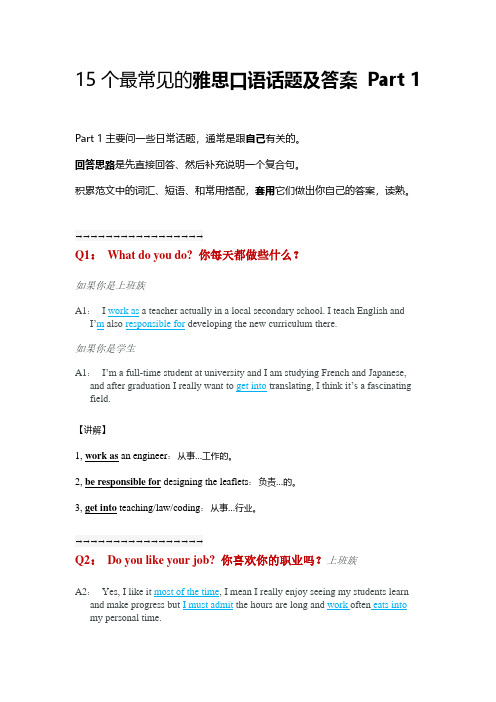
15个最常见的雅思口语话题及答案Part 1Part 1主要问一些日常话题,通常是跟自己有关的。
回答思路是先直接回答、然后补充说明一个复合句。
积累范文中的词汇、短语、和常用搭配,套用它们做出你自己的答案,读熟。
→→→→→→→→→→→→→→→→→Q1:What do you do? 你每天都做些什么?如果你是上班族A1:I work as a teacher actually in a local secondary school. I teach English and I’m also responsible for developing the new curriculum there.如果你是学生A1:I’m a full-time student at university and I am studying French and Japanese, and after graduation I really want to get into translating, I think it’s a fascinating field.【讲解】1, work as an engineer:从事…工作的。
2, be responsible for designing the leaflets:负责…的。
3, get into teaching/law/coding:从事…行业。
→→→→→→→→→→→→→→→→→Q2:Do you like your job? 你喜欢你的职业吗?上班族A2:Yes, I like it most of the time, I mean I really enjoy seeing my students learn and make progress but I must admit the hours are long and work often eats into my personal time.【讲解】1, most of the time后面通常是要表达相反的意见。
雅思口语part1有哪些常见困难(精选)

1.雅思口语part1有哪些常见困难1、茫目地套用模版大部分考生当考试以前做了很充分的准备,其中包含了精心准备了一些段子,而准备在考试里说更多,但是出现了无法预料的情况。
例子1:考官听完了自我介绍,正提出考生的全名同时还查看考生ID时,考生头脑一发热,此话题是我准备过的呀,无非是名字是谁起的,是否存在什么特殊意义,中国人根本不会随意的将名字改了,这个我熟,然后一通开讲。
其实,当每一次雅思口语考试开始时,都会有如此的一个ID检查的流程,请大家不要激动到直接开始讲段子啦。
应对策略:要摸清考试流程,同时,当大家回答问题时不仅要流畅,同时还要注意自然。
2、没听清问题,答非所问有许多考生当面对的问题:没听懂考官说的是什么,但却不好意思提出,只会造成使用简单的Yes或是 No来草率应对,亦或是根本答非所问。
显而易见的,成绩是会受到了影响。
应对策略:不断的提醒自己此为一个对话,如果需要的话,考官是能够不断重复刚才的问题的。
而只会有一点能够明确:如果是没听清,那用repeat,考官一般会一字不差的重得刚才的问题。
如果是听不懂,那么请用rephrase, paraphrase或是 explain,考官会换一种说法,很可能会尽量采用简单易懂的词汇。
3、题目不熟悉,无从下手雅思Part1话题有十分广泛的范围,近几年时间里新话题更是不断的变化。
若真的碰到陌生话题如何应对呢,说I don’t know吗?应对策略:一方面,大家所要做的是应变能力来救场。
必须能够展示出自己的分析能力。
另一方面,此已经提醒大家在平日练习准备上,可以多做头脑风暴,多扩充知识面。
2.如何运用雅思口语素材雅思口语的素材种类很多,像句式、名人名言以及新鲜例子等等。
当大家学会灵活运用这些句式,才能够把自己的表达能力提升,所以本文老师总结了雅思口语素材如何灵活运用。
《阿甘正传》里提出了一个经典句子:Life is like a box of chocolate, you never know what you'll gonna get. 这句话很好记,也不难说,同时包含了有的人生经历或意义,事实上能够适用到更多的话题卡中。
雅思口语part1-3考察范围及练习技巧
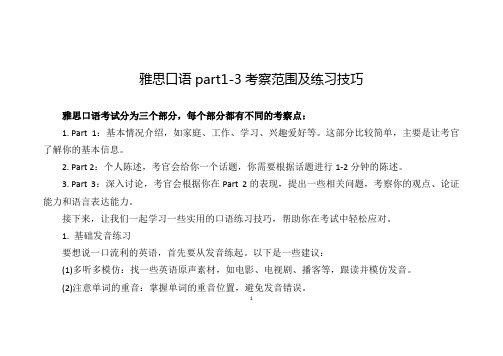
雅思口语part1-3考察范围及练习技巧雅思口语考试分为三个部分,每个部分都有不同的考察点:1. Part 1:基本情况介绍,如家庭、工作、学习、兴趣爱好等。
这部分比较简单,主要是让考官了解你的基本信息。
2. Part 2:个人陈述,考官会给你一个话题,你需要根据话题进行1-2分钟的陈述。
3. Part 3:深入讨论,考官会根据你在Part 2的表现,提出一些相关问题,考察你的观点、论证能力和语言表达能力。
接下来,让我们一起学习一些实用的口语练习技巧,帮助你在考试中轻松应对。
1. 基础发音练习要想说一口流利的英语,首先要从发音练起。
以下是一些建议:(1)多听多模仿:找一些英语原声素材,如电影、电视剧、播客等,跟读并模仿发音。
(2)注意单词的重音:掌握单词的重音位置,避免发音错误。
1(3)练习连读和吞音:这是提高口语流利度的关键。
2. 积累词汇和句型丰富的词汇和多样的句型是口语表达的基石。
以下是一些建议:(1)分类记忆单词:按照话题分类,如家庭、工作、教育等,积累相关词汇。
(2)学习常用句型:掌握一些固定的句型,如描述原因、表达观点等。
(3)造句练习:将新学的词汇和句型用于实际造句,加深记忆。
3. 模拟考试场景提前适应考试场景,有助于减轻紧张情绪。
以下是一些建议:(1)找朋友或家人模拟考试:让他们扮演考官,提问并计时。
(2)录制自己的回答:用手机或相机录下自己的回答,回放检查发音、语速、表情等。
(3)参加线上或线下口语练习群:与他人一起练习,互相学习、取长补短。
4. 提高逻辑表达能力在口语考试中,逻辑清晰的表达能力至关重要。
以下是一些建议:(1)学会用总分总的结构回答问题:先给出观点,再阐述原因和例子,最后总结。
2(2)使用连接词:如“firstly, secondly, finally”等,使回答更具条理性。
(3)练习思维导图:在回答问题前,用思维导图梳理思路。
5. 增强自信心自信心是成功的一半。
雅思口语part1-3的解题套路
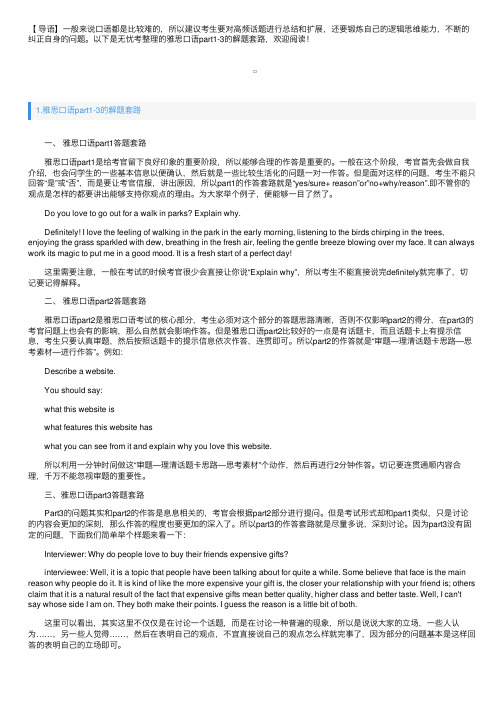
【导语】⼀般来说⼝语都是⽐较难的,所以建议考⽣要对⾼频话题进⾏总结和扩展,还要锻炼⾃⼰的逻辑思维能⼒,不断的纠正⾃⾝的问题。
以下是⽆忧考整理的雅思⼝语part1-3的解题套路,欢迎阅读!1.雅思⼝语part1-3的解题套路 ⼀、雅思⼝语part1答题套路 雅思⼝语part1是给考官留下良好印象的重要阶段,所以能够合理的作答是重要的。
⼀般在这个阶段,考官⾸先会做⾃我介绍,也会问学⽣的⼀些基本信息以便确认,然后就是⼀些⽐较⽣活化的问题⼀对⼀作答。
但是⾯对这样的问题,考⽣不能只回答“是”或“否”,⽽是要让考官信服,讲出原因,所以part1的作答套路就是“yes/sure+ reason”or”no+why/reason”.即不管你的观点是怎样的都要讲出能够⽀持你观点的理由。
为⼤家举个例⼦,便能够⼀⽬了然了。
Do you love to go out for a walk in parks? Explain why. Definitely! I love the feeling of walking in the park in the early morning, listening to the birds chirping in the trees, enjoying the grass sparkled with dew, breathing in the fresh air, feeling the gentle breeze blowing over my face. It can always work its magic to put me in a good mood. It is a fresh start of a perfect day! 这⾥需要注意,⼀般在考试的时候考官很少会直接让你说“Explain why”,所以考⽣不能直接说完definitely就完事了,切记要记得解释。
雅思口语Part1说多久-答题建议-怎么拿高分
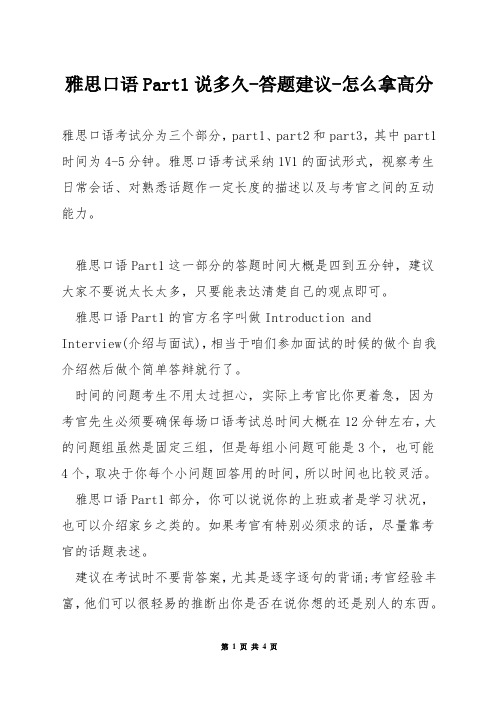
雅思口语Part1说多久-答题建议-怎么拿高分雅思口语考试分为三个部分,part1、part2和part3,其中part1时间为4-5分钟。
雅思口语考试采纳1V1的面试形式,视察考生日常会话、对熟悉话题作一定长度的描述以及与考官之间的互动能力。
雅思口语Part1这一部分的答题时间大概是四到五分钟,建议大家不要说太长太多,只要能表达清楚自己的观点即可。
雅思口语Part1的官方名字叫做Introduction andInterview(介绍与面试),相当于咱们参加面试的时候的做个自我介绍然后做个简单答辩就行了。
时间的问题考生不用太过担心,实际上考官比你更着急,因为考官先生必须要确保每场口语考试总时间大概在12分钟左右,大的问题组虽然是固定三组,但是每组小问题可能是3个,也可能4个,取决于你每个小问题回答用的时间,所以时间也比较灵活。
雅思口语Part1部分,你可以说说你的上班或者是学习状况,也可以介绍家乡之类的。
如果考官有特别必须求的话,尽量靠考官的话题表述。
建议在考试时不要背答案,尤其是逐字逐句的背诵;考官经验丰富,他们可以很轻易的推断出你是否在说你想的还是别人的东西。
2雅思口语Part1答题建议1. 答案不要只是一到两句话。
2. 回答要尽量自然。
3. 尽量对你的答案进行补充说明。
比如上述的第二个问题,大家可以这样说:I like reading very much. I like reading different things such as novels, newspapers and magazines.我喜爱读不同的读物,比如小说、报纸和杂志。
However, most of my time is spent reading novels in order to relax and forget my problems.但是我读得最多的还是小说,因为读小说能让我放松,忘记自己的烦恼。
4. 雅思阅读的Part 1一般有12个左右的问题,时间在5分钟左右。
雅思口语part1答题技巧讲解

第一确认回答的是“类别”而不是具体的某项app。第二用well作为开头回答的第一个词,会让人感觉回答不那么突兀。让listener也就是考官有一个准备的意识,知道这个同学即将要开始答题了。
请大家看清,题目问的是什么种类?而不是你经常用哪个app?什么是种类?scheduling app 时间安排类, information storage app 信息存储类, social networking app 社交软件类, games app 游戏类, lifestyle app 生活类等,这些都是种类,而不是具体的某一个app。
2020年9-12月雅思口语part23答案解析:关于健康的文章
Describe an article on health you read in a magazine or on the Internet.
You should say:
what it was
whereห้องสมุดไป่ตู้you read it
why you read it
雅思口语part1答题误区第二:题意理解错误,导致回答跑题
有一次咱们的每日练习题是:What kinds of apps do you often use? 这种问法是雅思口语P1P3的一类高频问法,什么种类。
但咱们同学90%以上的回答都是I often use Wechat, Youdao, Taobao… 考官心里打满问号,然后说:We use What’s app, google and amazon…… 哎,这回答丢分真的好可惜。
- 1、下载文档前请自行甄别文档内容的完整性,平台不提供额外的编辑、内容补充、找答案等附加服务。
- 2、"仅部分预览"的文档,不可在线预览部分如存在完整性等问题,可反馈申请退款(可完整预览的文档不适用该条件!)。
- 3、如文档侵犯您的权益,请联系客服反馈,我们会尽快为您处理(人工客服工作时间:9:00-18:30)。
雅思口语Part1答题技巧分享
雅思口语考试总共分为三个部分,根据考生具体的考试情况,历时十到十五分钟不等。
而雅思口语Part 1作为口语考试的第一部分,相对其他两个部分来说还是比较简单的,雅思口语Part 1主要也是针对考生的基本信息,考官也会在雅思口语Part 1部分向学生提一些关于个人的问题,数量大概是4-9个,小编也总结了雅思口语Part 1答题技巧。
一、中国类题目概述
所谓中国类题目,是指题目中涉及到中国或中国人的题目。
例如,How do Chinese people spend their holiday? 由于考官大都比较关心中国的情况,所以这类题目出现的频率很高。
因此,分析解答这类题的技巧就显得十分必要。
那么,我们该如何回答这类题目呢?要想回答好这类问题,考生应注意不能讲自己觉得某个问题怎么样,因为题目问的是中国人的想法,只注重个人则会造成以偏概全,容易给考官留下不客观的印象。
众所周知,中国人口多,因此说到中国或中国人的态度及想法时,进行适当的分类,运用分类法进行回答不失为上策。
二、如何分类
我们已经知道,回答中国类的题目应该运用分类法。
但是,中国人口众多,我们应该如何分类呢?根据不同情况,我们可以从以下三个角度进行分类:
(1)按年轻人和老年人分类
我们来看一道题目:What’s the most popular music in China? 这道题目显然不能只讲自己喜欢的音乐,也不宜只提供一种音乐类型。
我们都知道,年轻人和老年人喜欢的音乐类型可能完全不同,因此我们可以这样回答:
For most young people, they like rock or pop music. But for most old people, they like opera or folk music.
(2)按男人和女人分类
再来看一道题目:What’s the most popular sport in China? 这道题如果只讲自己喜欢的运动,则显得太主观,且不够全面。
对于运动,男人和女人的喜好稍有不同,因此我们可以依次进行分类:
For most men, they like basketball or football. But for most women, they like table tennis or badminton.
(3)按大人和小孩分类
雅思口语Part1中有这样一题:Do Chinese people like to celebrate birthday?对于喜不喜欢过生日,大人和小孩各有不同,因此我们可以这样回答:
For children, birthday is everything, and they enjoy celebrating it. But for some adults, they think birthday is just a normal day and don’t like to celebrate it any more.
(4)一般分类
雅思口语Part1中还有这样一题:Is teaching a popular job in China? 对于教师在中国到底是不是流行的工作,真是公说公有理,婆说婆有理,每个人的意见都可能出现分歧。
因此,回答这题我们不妨进行一般的分类:
Some people think being a teacher is popular for the high salary, but others don’t think so as they believe it is too tired to be a teacher.
三、如何对比
我们注意到,用分类法回答中国类的题目时,需要将两类人进行对比。
因此,回答好这类题目,我们还要解决一个问题,那就是如何进行对比。
对比的方法有很多种,最简单但最有效的方法就是使用对比句型。
我们先来看一些对比句型:
a) A…, but B….
b) While A is…, B is ….
c) On one hand, A….. On the other hand, B….
d) A…. On the contrary, B….
e) A…. In contrast, B….
f) A…. However, B….
掌握以上对比句型,可以帮助大家在回答对比类的题目时更有结构性,也更容易拿高分。
我们来看一道关于电影的题目:What is the most popular kind of film in China? 显然,根据以上分析,这题属于中国类的题目,适合用分类法进行回答,并用上相应的对比句型。
我们可以这样回答:Some people like peony, our national flower. In contrast, others may find rose very beautiful.
同样地,对于What is the most popular pet in China? 这样的题,我们也可以用同样的方法回答,如:You know, China has a large population, so we can’t be too generalized. While most people prefer raising dog or cat, a few people may choose animals like bird or fish.
四、如何引入对比
最后,我们讨论一下应如何引入对比。
直接说出分类中的对比,不免有些唐突,加上一句引入语能使回答听起来更加自然。
下面是一些可以用来引入对比的句子:
a) Well, it depends.
b) I think it all depends.
c) Well, choices are divided.
d) You know, China has a large population, so we cannot be too generalized.
e) There is a difference in preference between A and B.
f) It may sound too absolute if I don’t go into classification.
雅思口语Part1中有这样一题:Do Chinese people like changing their names?同样地,不同人有不同的喜好,因此我们可以这样回答:
I think it all depends. Most people in China don’t like changing their names. However, some of them prefer doing that.
五、注意
回答中国类题目时,我们应注意:虽然大部分中国类题目都可以用分类法回答,但也不是所有题目都可以。
例如以下题目:
In China, do women change their names when they get married?
What are the characteristics of schools in China?
What kinds of majors are available in China?
回答这种中国类的题目,则要求考生用自己的观点回答,不可盲目分类。
以上对雅思口语Part1中国类题目进行了一个梳理,并分析了回答这种题目的方法和技巧。
回答这类题目时,应适当地运用分类法,增加回答的客观性。
当然,这类题目有很多,远远超过以上所举的例子。
但是,只要记住运用分类法的规则,碰上类似的题,不管是难是易,我们都可以回答地游刃有余。
更多有关雅思知识技巧请看外朗教育官网:
/course/newlist/1-20.html。
